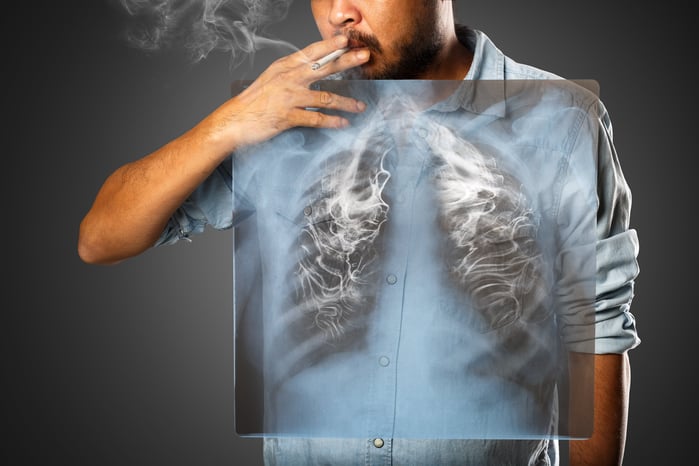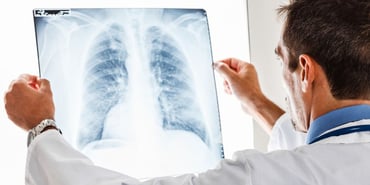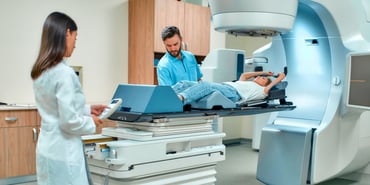
The air we breathe is what keeps us alive. And the quality of that air is critical. Anything that’s smoked or vaped, whether it’s you or someone you’re near, changes the air quality. And that impacts how well your lungs can function, especially over time.
If you’re a smoker or used to smoke, live with a smoker, or are facing a lung cancer diagnosis, here's what you need to know about tobacco and lung cancer, its causes, symptoms, and treatment options.
Smoking is the Primary Cause of Developing Lung Cancer
Almost all (80-90%) of people who die from lung cancer have a history of smoking. That includes current smokers, past smokers, and people who breathe tobacco smoke at home or in the workplace (secondhand smoke). Smoking cigars, pipes or e-cigarettes, vaping, and using chewing tobacco are all linked to cancer. Smokers are up to 30 times more likely to get lung cancer than non-smokers.
Tobacco and Lung Cancer
Tobacco smoke damages the cells lining the lungs. Smoke contains more than 70 chemicals that are known to cause cancer. When smoke enters your lungs, the cells begin to change immediately. At first, your body can repair the damage. However, as the cells become more and more damaged with more smoking, they can develop into cancer.
Second-Hand Smoke Causes Lung Cancer
Secondhand smoke is the second biggest risk factor for developing lung cancer. The American Cancer Society reports that secondhand smoke causes more than 7,000 cancer deaths each year.
Electronic Cigarette & Vaping
Data continues to mount about the dangers of electronic cigarettes (e-cigarettes) and vaping. The Centers for Disease Control and Prevention has reported more than 60 incidents of people using vape pens (vaping) becoming gravely ill. The chemicals in e-cig vapors cause lung damage. And, because it’s a water-based vapor, it penetrates more deeply into the lungs (versus just the lining), causing more damage.
Other Causes of Lung Cancer
The other 10 to 20% of lung cancers are caused by:
- Previous radiation treatment to the chest area
- Exposure to radon gas, an odorless gas produced naturally in some soils, can accumulate in homes or buildings and mix with the air you breathe
- Exposure to asbestos, a building material that is still inside many older homes and buildings
- Exposure to diesel exhaust, arsenic, chromium, or nickel
- Air pollution
- Family history of lung cancer
While most lung cancer deaths occur in older people, researchers at Johns Hopkins report that lung cancer is increasing in younger people. Each year, there are at least 30,000 new lung cancer cases in people under the age of 50. Lung cancer will kill two-thirds of these younger patients.
Related reading: Top 5 Causes of Lung Cancer in Non-Smokers
Myths About Smoking and Lung Cancer
Smoking can be a difficult habit to break for some people. It's not surprising that there are many myths going around about quitting smoking and what it means for your health. The truth is, however, that these are just myths -- and if you’re a smoker, you should stop smoking now for the sake of your health. Here are just a few of the myths out there that make people think twice before they stop smoking.
"Why bother to stop smoking since it won't reduce my risk of lung cancer?"
Research shows that stopping smoking can help reduce your risk. The less time your lungs are exposed to the chemicals, the better. Stop now for the best chance of not developing lung cancer. If you already have lung cancer, you should quit immediately to help stop the spread of the disease, reduce inflammation in the lungs, and minimize the amount of stress that smoking places on your body. Here are some tips to help you stop smoking.
"E-cigarettes and vaping can't harm your lungs."
This idea is 100% false. While e-cigarettes present less of a risk for lung cancer than regular smoking, medical experts and the public recently learned that vaping could cause its own kind of major harm. As of January 2020, the CDC reported 60 incidents where vapers became very sick with a condition called EVALI (e-cigarette or vaping use is associated with lung injury).
"I'm a smoker, but I'm too young to get lung cancer."
It's true that the average age for developing lung cancer is 70 years old. However, that doesn’t mean you can’t develop it at a much younger age. Each year brings about 30,000 new diagnoses of lung cancer in people who are under the age of 50. Unfortunately, about 21,000 of those patients will die from the disease.
"Nicotine replacement therapies such as patches can cause cancer."
Nicotine replacement therapies are a good solution for helping you stop smoking. There is no known link that nicotine replacement therapy causes cancer.
"If you don't smoke, you won't get lung cancer."
It may surprise you that 20% of people with lung cancer aren't smokers and have never been a smoker. There are many factors that come into play when it comes to lung cancer, including toxins in the environment and your genetic predisposition to getting cancer. In short, you can still get lung cancer even if you're not a smoker. So taking care of your lungs and being aware of the quality of the air you and your loved ones breathe is essential.
Help to Stop Smoking in the Portland-Vancouver Area
Facing a cancer diagnosis is life-changing. Our oncologists at Compass Oncology deliver unparalleled cancer treatment that is comprehensive, compassionate, and patient-centered. We know how important it is to protect your lungs and overall health. That is why we are starting a smoking cessation program to help you stop smoking and regain your health.


